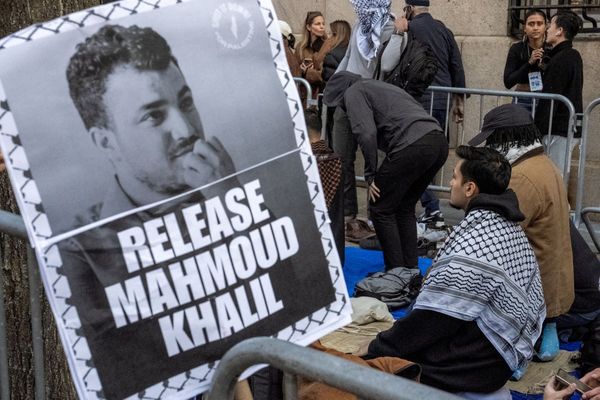
Washington, DC – He has called for expelling “disloyal” citizens of Israel, idolised a mass shooter responsible for a deadly assault on a Hebron mosque in 1994, and called for loosening rules of engagement to make it easier for Israeli forces to shoot Palestinians.
Itamar Ben-Gvir is poised to take up a prominent post in the next Israeli government after this week’s elections saw his far-right Otzma Yehudit (Jewish Power) Party emerge with record support.
In the United States, which remains Israel’s most important international ally, Ben-Gvir’s ascent has already drawn concerns, including from some of the country’s staunchest backers in the US Congress.
While the gains of Israel’s far right will not rock US-Israeli ties, analysts have said the election results will make it more difficult for liberal US supporters of Israel to keep defending the country.
“The inclusion of far-right Jewish supremacists in Israel’s governing coalition will add to the ongoing narrative shift that is making it increasingly difficult for folks to continue to make excuses for Israel’s war crimes and human rights violations,” said Tariq Kenney-Shawa, US policy fellow at Al-Shabaka, a Palestinian think-tank.
Rightward shift
Ben-Gvir’s party and its religious Zionist allies are set to become the third-largest bloc in the Knesset, Israel’s parliament, positioning them to play a decisive role in a right-wing coalition that will likely see former Prime Minister Benjamin Netanyahu return to power.
Ben-Gvir, who claims to have moderated his anti-Palestinian positions in recent years, defended himself against criticism from a US lawmaker before the election, saying that Israel’s enemies were trying to “besmirch” him by calling him and his party racist. “The truth is that we are anti-racist – we are fighting against the racist antisemitism fomenting within the boundaries of our homeland,” he said in a statement last month, as reported by The Times of Israel.
Palestinian rights supporters have said Ben-Gvir’s brand of racist politics is not new, however, pointing to successive Israeli governments that have pursued policies that oppress Palestinians with full American support.
“It’s a repeat of the same saga that we’ve seen before,” said Yousef Munayyer, a senior fellow at the Arab Center Washington DC. “Every few elections, there is a new figure on this team that makes their political career by being as openly fascist and as openly racist towards Palestinians.”
Before Ben-Gvir, Israeli politicians – including former Prime Minister Naftali Bennett and finance minister Avigdor Lieberman – used anti-Palestinian rhetoric to advance their careers. And they are now seen as part of the mainstream.
“The centre of gravity in Israeli politics today is much further right … than it was 20 years ago,” Munayyer said. “The fascists of yesteryear now seem more centrist in comparison – when in reality the entire system is built around racism towards Arabs and Palestinians in the country.”
Good call just now with Benjamin @Netanyahu. I congratulated him on his victory and told him I look forward to working together to maintain the unbreakable bond. 🇺🇸 🤝🇮🇱
— Ambassador Tom Nides (@USAmbIsrael) November 3, 2022
But the rise of the Israeli far right this time has come as US Democrats, including President Joe Biden, have been sounding the alarm about the threat far right movements in the US pose to democracy.
“No matter the shape of the Israeli coalition and government, our relationship will be strong and enduring,” US Department of State spokesperson Ned Price told reporters on Monday before the Israeli elections.
Two days later, as it became clear that Israel’s far right would be in the incoming government, Price said the US hoped “all Israeli government officials will continue to share the values of an open, democratic society, including tolerance and respect for all in civil society, particularly for minority groups”.
‘Moment of reckoning’
Still, a meaningful change in US support for Israel is not expected.
Biden, a self-described Zionist who has pledged to put human rights at the heart of US foreign policy, has often stressed that the US’s commitment to Israel is “ironclad”, and the bipartisan consensus over unconditional US military aid to Israel has remained strong.
That is despite leading human rights organisations, including Amnesty International and Human Rights Watch, accusing Israel of imposing apartheid on Palestinians.
Beth Miller, political director at JVP Action, the political arm of Jewish Voice for Peace, a Jewish-American organisation that supports Palestinian rights, said while the right-wing victory in Israel is connected to the growing prominence of far-right movements around the world, it represents an “escalation” in an already unjust system of “apartheid”.
“Israel shouldn’t be separated from the rise of far-right authoritarianism and fascism across the globe,” Miller told Al Jazeera.
“At the same time, the US has a longstanding history of always turning its head the other way whenever the Israeli government is carrying out systemic human rights violations.”
While the official US approach to Israel will likely be business as usual, where analysts and advocates anticipated change was in the continuing debate about Israel in the country.
Miller said the far right’s victory is a “moment of exposure” for Israel’s longstanding “Jewish supremacist” policy, under which Jewish people in the territory Israel controls have more rights than non-Jewish people, namely Palestinians. “Now, what that means is that we’re in a moment of reckoning here in the US,” she told Al Jazeera.
For his part, Munayyer noted that Netanyahu will likely have a cohesive right-wing majority in the Knesset after years of fragile government coalitions, which will enable an Israeli “agenda that is anti-Palestinian on steroids”.
“It is going to create flashpoints; it is going to create confrontations and going to create those moments of extreme difficulty for people who want to defend Israel here in the United States,” he said, adding that some of Israel’s “reflexive defenders” are already trying to spin the election results into something good.
US-Israel ties ‘sacrosanct’: AIPAC
The American Israel Public Affairs Committee (AIPAC) pro-Israel lobby group, for example, has said the Israeli election – the fifth in four years – should be celebrated as a democratic exercise.
“We must remind everyone that the relationship between these two allies is sacrosanct and must rise above the views of any politician, political party, or ideology,” AIPAC President Betsy Berns Korn said in an email to supporters on Wednesday.
Israel’s critics have rejected the claim that Israel is a democracy because millions of Palestinians who live under Israeli control in the West Bank, Gaza Strip and East Jerusalem do not get to vote in Israeli elections.
J Street, a liberal Jewish-American group that described itself as pro-Israel and pro-peace, called for reassessing the US position of unconditional support for any Israeli government.
“J Street has long stressed that a relationship based on an ‘Israel right or wrong’ approach that tolerates without meaningful objection settlements, discrimination and endless occupation serves no one’s interests – not the United States’, not the State of Israel’s, and not the Jewish people’s,” the group said in a statement on Wednesday.
“Under the looming ultra-right Israeli government that may take shape, that business-as-usual approach will be strained to untenable limits.”
As the debate about Israel appears set to intensify in Washington, critics have highlighted that Prime Minister Yair Lapid’s short-lived government, which is often described as centrist, also held anti-Palestinian policies.
The outgoing coalition built Israeli settlements, authorised near-daily, deadly military raids in the West Bank, and launched an unprovoked attack on Gaza in August that killed 16 children.
“Regardless of who is [prime minister] or wins a majority in the Knesset, Israeli leadership is bent on maintaining the occupation and continuing Palestinian dispossession albeit with slightly varying tactics,” Kenney-Shawa, of Al-Shabaka, told Al Jazeera in an email.
“Their rhetoric and tactics may differ along the margins, but the strategy remains the same: entrench military occupation and apartheid.”







